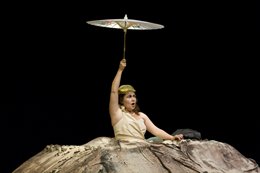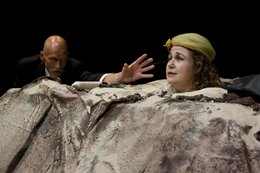AC Productions brings commitment and dedication to Happy Days, even if it is a somewhat thankless task (there were eleven at the performance being reviewed). Happy Days can be a challenging work but, to echo Miller’s line in Death of a Salesman at the Gate, “attention must be paid.” When we have the privilege of a fine production of a key text, we should show more willing to lend our support.
 This Happy Days demonstrates a meticulous fidelity to Beckett, down to each single move. Director Peter Reid and actor Alex Cusack (Winnie) have carefully crafted every nuance of language and gesture. Visually, the production remains faithful to the author’s declared intentions. There’s a fine, textured mound (designed by Reid), calibrated to allow Winnie’s head and “shoulders bare, low bodice, big bosom” adequate space in Act One and to facilitate her embeddedness in Act 2.
This Happy Days demonstrates a meticulous fidelity to Beckett, down to each single move. Director Peter Reid and actor Alex Cusack (Winnie) have carefully crafted every nuance of language and gesture. Visually, the production remains faithful to the author’s declared intentions. There’s a fine, textured mound (designed by Reid), calibrated to allow Winnie’s head and “shoulders bare, low bodice, big bosom” adequate space in Act One and to facilitate her embeddedness in Act 2.
We see this Winnie at close quarters, and Alex Cusack does not flinch from the task of conveying every modulation in Winnie’s mood, from reflective, nostalgic, up-beat, demanding to doubtful and (in the more sombre second half) fearful. Cusack’s command of technique is evident when Winnie, now sunk up to her chin, attempts to identify what remains – nose, nostrils, cheeks, lips, tongue, eyebrows and all animated with subtlety and accuracy. Her vocal range is impressive as she conveys the sweep and dip of Winnie’s emotions from a kind of bravura Sybil Fawlty, full of hearty determination, to the isolated, insecure, doomed figure in a mound. Cusack gives a generous, intimate performance - chipper, putting a brave face on things... "[Smile broader] ‘No No.’ [smile off.]"
 The aforementioned mound is good mound, too, for Willie, a part to which Vincent Fegan brings a graceful accuracy. His struggle towards Winnie and the summit is a painful process of discouragement and failure. The slope is too great for him to make it: union is denied. Earlier, he demonstrates a fascinating delicacy of hand movement, as when he impatiently gestures to Winnie for the return of his dirty postcard. The production is full of finely-observed details like that.
The aforementioned mound is good mound, too, for Willie, a part to which Vincent Fegan brings a graceful accuracy. His struggle towards Winnie and the summit is a painful process of discouragement and failure. The slope is too great for him to make it: union is denied. Earlier, he demonstrates a fascinating delicacy of hand movement, as when he impatiently gestures to Winnie for the return of his dirty postcard. The production is full of finely-observed details like that.
But, for all that, it fails to take flight – not for want of trying, but because there’s a dependency in theatre on a chemistry between actor and audience, which remains stillborn in Players. Even the Players’ foyer proves to be dispiriting – you sink into one of the scattered sofas and the fact that you can’t get out of it easily induces a kind of pre-performance torpor. When you are in the company of the eleven lost souls – three tourists, a reader with her nose in her book, a youth with clacking shoes, a texting woman (who tut-tuts her way through Act 1 and, like the solitary man with a rucksack, doesn’t return after the interval) and three friends of the company. The audience is dispersed around the auditorium, space and disconnection and empty seats between. There is no cohesion, no common thread of response – a performer’s nightmare. Beckett and Alex Cusack and AC Productions deserve better than this!
Derek West is the Arts & Education Officer of the National Association of Principals and Deputy Principals. He edits the Association’s publications and administers its arts scheme for schools, Creative Engagement.